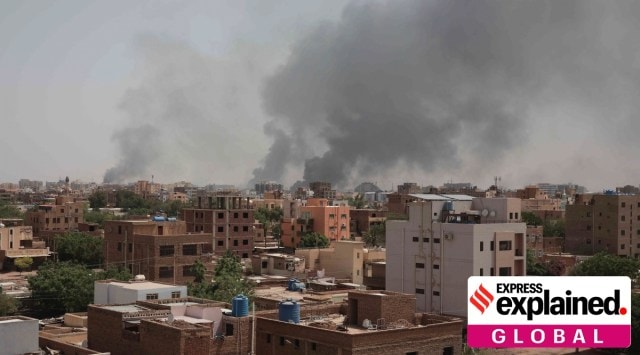Why are Sudan’s army and paramilitary forces fighting each other?
Army chief Lt Gen Abdel Fattah al-Burhan and commander of the paramilitary Rapid Support Forces Mohamed Hamdan Dagalo are at odds with each other over the proposed transition to civilian rule.
 Smoke rises from a central neighbourhood of Khartoum, Sudan, Sunday, April 16, 2023. Nearly 200 people have been killed since intense fighting began Saturday. The Sudanese military and a powerful paramilitary group are battling for control of the chaos-stricken nation. ( AP Photo/Marwan Ali)
Smoke rises from a central neighbourhood of Khartoum, Sudan, Sunday, April 16, 2023. Nearly 200 people have been killed since intense fighting began Saturday. The Sudanese military and a powerful paramilitary group are battling for control of the chaos-stricken nation. ( AP Photo/Marwan Ali) At least 185 people have been killed and 1,800 more, including combatants, have been wounded in Khartoum, the capital of Sudan, since fierce fighting broke out between the country’s army and paramilitary forces on Saturday, UN envoy Volker Perthes said
Among those killed is an Indian national identified as Albert Augustine, who was hit by a stray bullet, the Indian Embassy in Khartoum said. Augustine, 48, belonged to Nellippara village in Kerala’s Kannur district and was a security manager with a company in Sudan.
Clashes erupted after weeks of heightened tensions between the Rapid Support Forces (RSF), a paramilitary group led by Mohamed Hamdan Dagalo — also known as Hemedti — and the military, headed by Lt Gen Abdel Fattah al-Burhan. The two generals disagree over the proposed transition to civilian rule in Sudan.
Residents told news outlets that sounds of heavy artillery firing across Khartoum, the adjoining city of Omdurman, and nearby Bahri continued through Sunday.
The United States, the United Kingdom, the European Union, China, Russia, Saudi Arabia, and the United Arab Emirates have urged the warring parties to “immediately end hostilities without precondition”. The BBC reported that United Nations Secretary General António Guterres spoke to both Burhan and Dagalo, asking them to end the violence.
In a statement, US Secretary of State Antony Blinken said, “I urge General Abdel Fattah Abdelrahman al-Burhan and General Mohamed Hamdan Degalo to take active measures to reduce tensions… The only way forward is to return to negotiations that support the Sudanese people’s democratic aspirations.”
What is the origin of the Sudan conflict?
The roots of the ongoing conflict go back to April 2019, when Sudan’s long-serving authoritarian President Omar al-Bashir was overthrown by military generals following a countrywide uprising against him.
Despite Bashir’s ouster, civilians continued their demonstrations, seeking democratic elections and the establishment of a civilian government. This led to an agreement between the military and the protesters four months later, under which it was decided to constitute the Sovereignty Council, a power-sharing body of military officers and civilians, which would lead Sudan to elections at the end of 2023. Abdalla Hamdok was appointed Prime Minister for the transitional period, and he took office in August that year.
But the new arrangement was short-lived as the military overthrew Hamdok’s government in October 2021, and Burhan became de-facto leader of the country. Dagalo, vice-president of the ruling council and Burhan’s partner in the military seizure of power, became the second-in-command. Burhan announced that the military would hold power until elections are held in July 2023.
Tussle between Army and RSF
Soon after the 2021 coup, relations between the military and the RSF — which was formed in 2013, and has been accused of human rights abuses, including the massacre of more than 120 protesters in June 2019, according to the BBC — soured.
Burhan and Dagalo disagree over how the 10,000-strong RSF should be integrated into the army, and which authority should oversee that process. Also, Dagalo wanted to delay the integration for 10 years but the army said it would take place in the next two years.
Over the past few weeks, the RSF was redeployed around the country, which the army saw as a provocation and threat. With both sides on edge, a ferocious battle broke out on Saturday.
Repercussions for Sudan
The third largest country in Africa by size has seen repeated pro-democracy protests since the 2021 coup. But the battle between the army and RSF has likely made Sudan’s transition to democracy more difficult. Some experts fear the tussle could transform into a wider conflict leading to the country’s collapse.
Sudan’s economy is struggling, battered by hyperinflation and crippled by massive foreign debt. Billions of dollars given in international support and debt relief, were frozen after the ouster of the Hamdok government.
A coalition of civilian groups that has been pushing for Sudan’s transition to democracy, told Reuters in a statement, “This is a pivotal moment in the history of our country. This is a war that no one will win, and that will destroy our country forever.”






































